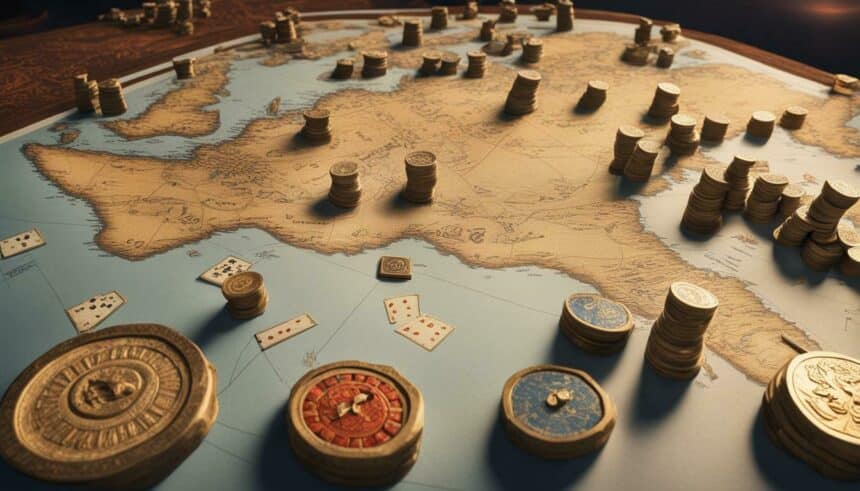For centuries, gambling has been a source of entertainment and excitement for people all over the world. But where did gambling originate? Let’s dive into the history to find out!
It’s believed that gambling originated in ancient civilizations, where people would place bets on games and sports. Over time, this practice evolved into the complex systems we know today, including dedicated gambling establishments.
In this article, we will explore the fascinating history of gambling, including its early origins, the evolution of betting, the rise of casinos, and its integration into different cultures. We will also discuss the legalization and regulation of gambling, as well as the impact of online gambling on the industry.
Key Takeaways:
- Gambling originated in ancient civilizations where people would place bets on games and sports.
- The practice of gambling evolved into the complex systems we know today, including dedicated gambling establishments.
- In this article, we will explore the history of gambling, the evolution of betting, the rise of casinos, and its integration into different cultures.
- We will also discuss the legalization and regulation of gambling, as well as the impact of online gambling on the industry.
Gambling in Ancient Times
Gambling has been around for thousands of years, and the earliest forms of the practice can be traced back to ancient civilizations. From Mesopotamia to ancient China, people have been placing bets and playing games of chance for centuries.
One of the earliest known forms of gambling was dice, which were commonly used in ancient Greece and Rome. Dice games were often played by soldiers, and it wasn’t long before they became popular among civilians as well.
Gambling in Ancient Times
“The dice were loaded in favor of the house, which meant that players had a much smaller chance of winning than they do today.”
In ancient China, gambling was also a popular pastime. The Chinese game of Mahjong is believed to have originated in the 19th century, but some historians believe it may be much older than that. Regardless of its origins, Mahjong remains one of the most popular gambling games in the world today.
The ancient Egyptians were also known to enjoy games of chance, as evidenced by several paintings and other artifacts that have been discovered in tombs and other archaeological sites.
As gambling continued to evolve, so did the games that were played. Card games, for example, became popular in medieval Europe and eventually made their way to the New World. Today, there are countless different types of casino games that are played all over the world.
| Game | Description |
|---|---|
| Blackjack | A card game where players try to beat the dealer by getting as close to 21 points as possible without going over |
| Roulette | A game where players bet on where a small ball will land on a spinning wheel |
| Poker | A card game where players try to have the best hand and win money from other players |
While there have been many changes to the way gambling is played over the years, one thing remains constant: the excitement and thrill that comes with taking a risk and hoping for a win.
The Evolution of Betting
Betting has been a popular activity throughout history, and it has evolved significantly over the years. The earliest forms of betting were simple wagers between individuals, often based on the outcome of a game or sporting event.
As societies became more complex, so too did the betting practices of their citizens. In ancient Rome, for example, betting became a more organized activity, and specialized venues were established for people to place their bets. Similarly, in ancient China, gambling was popularized through the use of tiles and cards.
However, it wasn’t until the Middle Ages that betting became more widespread and formalized. This was largely due to the influence of the church, which sought to regulate and control gambling practices. The first official betting establishments were established in Italy during this period, and they offered a variety of games and activities for people to bet on.
Over time, betting continued to evolve, with new games and systems being introduced. By the 19th century, betting had become a major industry in many countries, and it was heavily regulated by governments and other authorities. This led to the emergence of more complex systems, such as pari-mutuel betting, which allowed multiple individuals to pool their bets together.
Today, betting continues to be a popular activity, and it has become more accessible than ever, thanks to the rise of online betting platforms. These platforms have revolutionized the industry, allowing people to place bets from the comfort of their own homes and opening up new opportunities for individuals and organizations to profit from the practice.
The Rise of Casinos
As gambling became more popular, dedicated establishments began to emerge to cater to the growing demand. The first casinos appeared in Italy in the 17th century, offering a variety of games such as baccarat and roulette. These casinos quickly spread throughout Europe and eventually made their way to the United States.
Las Vegas, Nevada, is widely considered the gambling capital of the world and the birthplace of modern casinos. The first casino in Las Vegas, the Golden Gate Hotel and Casino, was opened in 1906. Over the years, more and more casinos were built in the city, and it became a hub for gambling enthusiasts from all over the world.
Casinos have played a significant role in the history of gambling, offering a range of games and entertainment options to patrons. From slot machines to table games like blackjack and craps, casinos provide an immersive gambling experience that has remained popular for decades.
| Casino Game | Origin |
|---|---|
| Baccarat | Italy |
| Roulette | France |
| Blackjack | France |
| Poker | United States |
Casinos continue to evolve, incorporating new technology and expanding their offerings to attract a wider audience. From luxury resorts to online casinos, the gambling industry continues to thrive, drawing in millions of players each year.
The Future of Casinos
“The future of casinos lies in providing a more personalized experience to players. With the help of technology, casinos can offer tailored promotions and games based on individual preferences. We can expect to see more interactive and immersive experiences as the industry continues to innovate.”
Gambling in Different Cultures
Gambling has been a part of many cultures throughout history, and each has its own unique traditions and practices associated with it. Here are a few examples:
China
In China, gambling has been a popular pastime for thousands of years. Traditional Chinese games like pai gow poker, mahjong, and sic bo continue to be played in casinos around the world. In fact, Macau, a special administrative region of China, has become one of the biggest gambling destinations in the world.
India
Gambling has a long history in India, with many of its myths and legends featuring characters playing games of chance. One popular game is called satta, which involves betting on numbers. However, in recent years, gambling has faced increased scrutiny and has been heavily regulated in the country.
Middle East
In the Middle East, gambling is largely forbidden in Islamic societies. However, many Muslims still engage in various forms of gambling, such as betting on horse racing and playing card games like tarot.
Native American Cultures
Gambling has been an important part of Native American cultures for centuries. Tribes would hold games of chance to settle disputes or improve their spiritual connections. Today, many casinos on Native American reservations operate under their own laws and regulations, allowing them to offer a wider range of gambling experiences.
These are just a few examples of the diverse ways in which gambling has been embraced and integrated into different cultures. The enduring appeal of gambling is a testament to its universal appeal and enduring popularity.
Gambling’s Legalization and Regulation
The legalization and regulation of gambling have had a significant impact on the industry throughout history. In recent times, many countries have shifted their stance towards gambling, legalizing and regulating it in various forms.
The impact of these regulations varies significantly. On the one hand, legalizing gambling can provide significant revenue for governments. On the other hand, it can also lead to problem gambling and other negative social effects. As such, many countries have taken steps to regulate the industry, setting age limits, requiring licenses and limiting the number of casinos or gambling establishments.
One such country is the United States. After banning gambling in the early 20th century, the US government began legalizing it state-by-state in the late 20th century. Today, gambling is legal in many states, with Las Vegas and Atlantic City being significant gambling hubs.
| Pros | Cons |
|---|---|
| Provides significant revenue for governments | Can lead to problem gambling and other negative social effects |
| Creates jobs | Limited number of casino licenses available, leading to competition between casinos |
| Encourages tourism | Can result in an increase in crime |
As the popularity of online gambling has grown, many countries have also taken steps to regulate internet gambling. The European Union, for example, has implemented an online gambling regulatory framework, providing guidelines for member states to regulate the industry. In contrast, some countries have taken a hardline approach, banning online gambling altogether.
Overall, the legalization and regulation of gambling have had tremendous effects on the industry. While there are potential downsides, the benefits provided by a regulated industry cannot be ignored. As such, it is important for governments to continue to monitor and regulate gambling in a manner that benefits society as a whole.
Online Gambling and Modern Era
The rise of the internet has brought about significant changes in the gambling industry, with the emergence of online gambling. Online gambling, also known as internet gambling, refers to any form of gambling that is conducted online. With the increasing popularity of smartphones and other mobile devices, online gambling like w88vip has become even more convenient and accessible.
The first online casinos emerged in the mid-1990s, offering a range of games such as blackjack, roulette, and slots. While online gambling faced significant challenges with regulations and legal restrictions at first, the industry has continued to grow and evolve.
Today, online gambling is a multi-billion dollar industry with an ever-growing number of online casinos, sportsbooks, and other gambling sites available. Online casinos offer a variety of digital versions of traditional casino games such as blackjack, craps, and roulette, as well as new and innovative games.
One of the biggest advantages of online gambling is convenience. Players can access their favorite games from the comfort of their homes, and at any time of the day or night. Online casinos also offer a wider range of games and betting options compared to traditional brick-and-mortar casinos.
However, online gambling also faces ongoing challenges. One of the biggest issues is the lack of regulation and oversight in some jurisdictions. This has led to concerns about fraudulent and unfair practices at some online casinos. Additionally, the easy accessibility of online gambling has raised concerns about problem gambling and gambling addiction.
Despite these challenges, online gambling is expected to continue to grow and evolve in the coming years, with new technology and innovations changing the landscape of the industry.
Conclusion
From its humble beginnings in ancient civilizations, gambling has evolved into a multi-billion dollar industry that spans the globe. The origins of popular casino games such as blackjack and poker can be traced back hundreds of years, while the rise of dedicated gambling establishments revolutionized the way people bet and play.
Despite its controversial past, the legalization and regulation of gambling has allowed it to flourish in many parts of the world, with many countries enjoying significant tax revenue from the industry. The emergence of online gambling has also opened up new opportunities for players and operators alike, but it has also brought new challenges in terms of regulation and addiction.
Despite its ups and downs throughout history, one thing remains clear: gambling is an enduring pastime that continues to capture the imagination of people from all walks of life. Whether it’s a simple game of cards with friends or a high-stakes poker tournament in a glitzy casino, the thrill of gambling is something that will never go out of style.
FAQ
Q: Where did gambling originate?
A: Gambling has roots that can be traced back to ancient civilizations, such as the Mesopotamians and Egyptians, who were known to engage in various forms of gambling.
Q: What is the history of gambling?
A: The history of gambling is vast and fascinating. It has evolved from simple games of chance to complex betting systems, and has been practiced in different forms across cultures throughout history.
Q: How was gambling practiced in ancient times?
A: In ancient times, gambling was often practiced through games of dice, cards, and other forms of wagering. It was a popular form of entertainment and social activity.
Q: What are the origins of popular casino games?
A: Many popular casino games have origins that can be traced back to ancient times. For example, card games like blackjack and poker have roots in Europe and Asia.
Q: How has betting evolved throughout history?
A: Betting has evolved from simple wagers on events to more complex systems, such as sports betting and online gambling. It has become a multi-billion dollar industry worldwide.
Q: How have dedicated gambling establishments played a role in the history of gambling?
A: Dedicated gambling establishments, such as casinos, have played a significant role in the history of gambling. They have provided a centralized location for people to engage in gambling activities.
Q: How has gambling been embraced and integrated into different cultures?
A: Gambling has been embraced and integrated into various cultures around the world. Different regions have unique traditions and practices associated with gambling.
Q: What is the legal and regulatory landscape of gambling?
A: The legalization and regulation of gambling vary from country to country and jurisdiction to jurisdiction. It is a complex field that involves social and economic considerations.
Q: How has the advent of online gambling revolutionized the industry?
A: The rise of online gambling has transformed the industry, offering convenience and accessibility to players. Online casinos have grown in popularity, but also face challenges in terms of regulation and security.
Q: What are the key points discussed in the article?
A: The article explores the origins and history of gambling, from ancient civilizations to the modern era. It also touches upon the rise of casinos, gambling in different cultures, legalization and regulation, and the impact of online gambling. The enduring appeal and ubiquity of gambling throughout history is emphasized.









